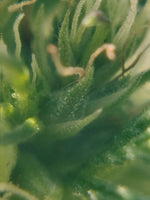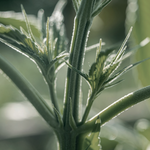What is a cannabinoid?
A chemical substance that directly or indirectly binds to the CB1 and CB2 receptors present in our body. There are 3 types of cannabinoids:
- Synthetic cannabinoids produced in a laboratory.
- Endocannabinoids produced by our body. Yes, the human body produces its own cannabinoids!
-
Phytocannabinoids produced by plants: cannabis but also pepper, cocoa.
Over 100 different cannabinoids
There are over 100 cannabinoids from the cannabis sativa plant which
have the potential to interact with our body. The most famous are
THC and CBD. There is also CBG, CBN and many others!
These cannabinoids present diverse therapeutic potential.

Why does the plant produce cannabinoids?
Cannabinoids are produced more, as an immune response, in cases of external stress caused by heat, drought or poor soil. Their purpose varies depending on: reduction of water evaporation / immobilization of insects / antibacterial antifungal.
The endocannabinoid system
Discovered in the 1990s, the endocannabinoid system is the subject of more and more studies: only 1 study in 1993 compared to 621 in 2021. This system is a set of receptors which influences the regulation of certain functions of our body, under the effect of endocannabinoids and exocannabinoids.
The system is made up of 2 types of receivers :
CB1: located at the level of the Central Nervous System
CB2: located in the immune system and Secondary Nervous System 











